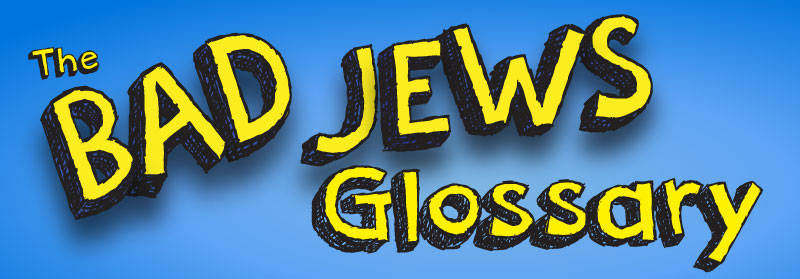The Bad Jews Glossary
It’s amazing how many Jewish words have entered mainstream American language. From chutzpah to kibbitz to nosh to shlep, we often use them in our daily conversations. Still, there might be Hebrew or Yiddish words or references in Bad Jews that may not be familiar to every theatre-goer. Here is a handy list. Learn them (we won’t ask you to pronounce them) and make Bubbe proud.
ABRAHAM FOXMAN: A Jewish American lawyer who served as the National Director of the Anti-Defamation League from 1987 to 2015 as currently the National Director Emeritus.
ALIYAH: A Hebrew word that means to “go up.” While originally it referred to ascending to Jerusalem to celebrate the Jewish Feasts, today it has come to mean the return of the Jews to the Land of Israel. Aliyah, simply stated, is the ingathering of the exiles from the four corners of the earth — it is the immigration of Jews back to their ancestral homeland.
ANTI-SEMITE: Someone who has or shows prejudice toward the Jewish people as a religious, racial, or cultural group.
CHAI: The chai (pronounced like the English greeting, “hi”) is a popular Jewish symbol that many Jews, young and old, traditional and liberal, recognize and understand. Literally translated, chai means “live,” “living,” and/or “The living God.” Related to the traditional Jewish toast l’chayim, “to life,” the chai is a reminder to value the time you have on earth: do not simply exist, but work, struggle, laugh, cry, smile, and love.
The chai also carries numerological meaning since the word’s two letters (Chet and Yud) add up to 18, thus making 18 a lucky number as well as a spiritual number. Guests at Jewish weddings often give gifts of money in multiple of 18, symbolizing a gift of luck or long life. Similarly, some Jewish people wear chai necklaces for good fortune, and as a cultural symbol that connects them to the living Jewish tradition.
HAIFA: The largest city in Northwestern Israel.
HILLEL: The largest Jewish campus organization in the world that connects students at more than 550 colleges and universities across North America and around the world.
HORA: A group dance that is common at Jewish celebrations such as weddings and bar mitzvahs.
HOWARD ZINN: A Jewish American historian, playwright, and social activist who wrote more than twenty books, including his best-selling and influential A People’s History of the United States.
JOADS: An extremely poor family of migrant farm workers featured in the novel The Grapes of Wrath, by John Steinbeck.
PASSOVER: A Jewish festival commemorating the liberation of the Israelites from slavery in Egypt.
SEDER: A Jewish ritual service and ceremonial dinner for the first night or first two nights of Passover.
SHOFAR: An ancient musical instrument made from the horn of a ram or other kosher animal, used for Jewish religious purposes.
SHIKSA: An often disparaging term of Yiddish origin used primarily in North American Jewish culture to describe a gentile (non-Jewish) girl or woman.
SHIVA: A traditional period of mourning in Judaism that lasts on week for the immediate family
SLICHA: A Hebrew word that means, “excuse me,” or “sorry.”
TALMUDIC: A central text of Rabbinic Judaism.
ZEALOT: Originally, the Zealots were members of a fanatical sect that arose in Judea during the first century a.d., which sought to incite a rebellion against the Roman Empire and expel it from the Holy Land. Today is commonly used to describe a person who has very strong opinions about something, and tries to make other people have them too.
